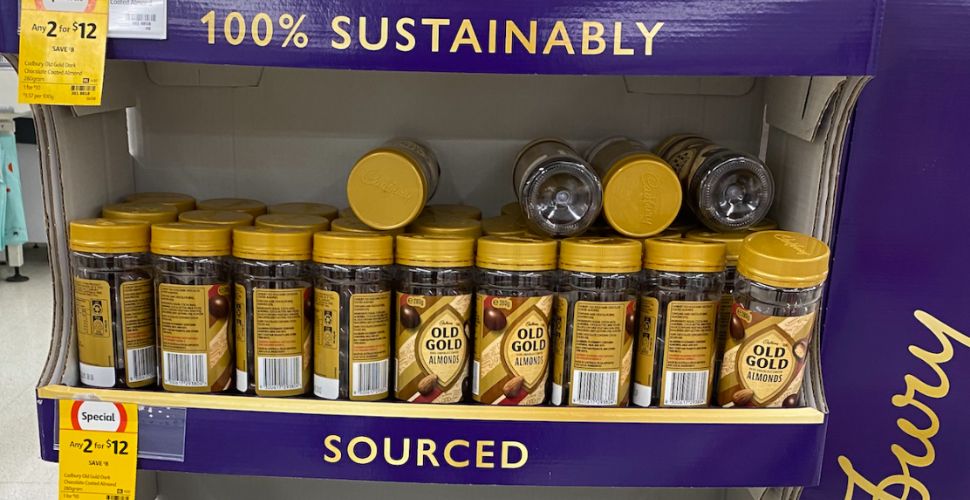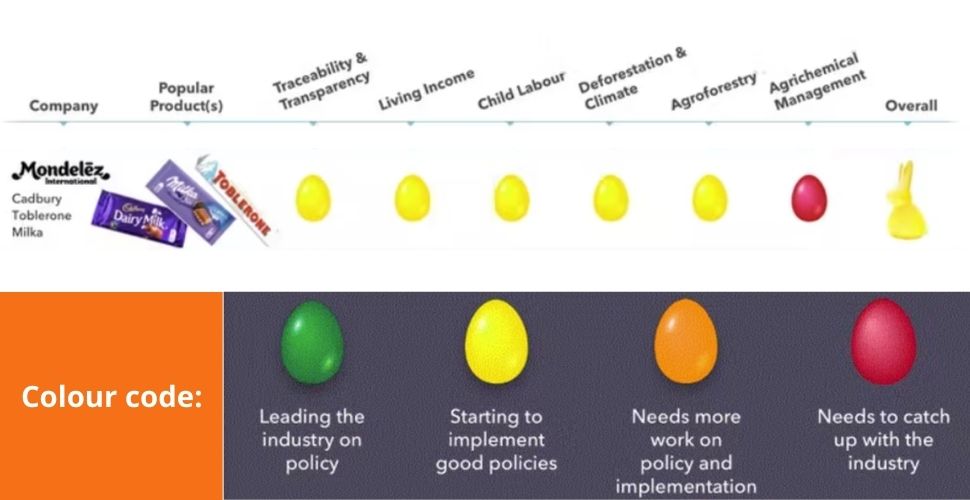“100% sustainably sourced cocoa,” says the sign on the stand promoting Cadbury, a popular chocolate brand of Mondelez International.
Many chocolate brands draw on similar language to promote their products— “ethically sourced”, and “sustainable cocoa”—but are these claims verified?
Chocolate (porky) pie, anyone?
Let’s look at the case of Cadbury’s parent company, Mondelez. Last year, the company participated in the 2022 Chocolate Scorecard, meaning they filled out a survey with key information about their cocoa-sourcing practices which was later graded by experts. Here’s the rating given by experts, along with the color code.
As you can see, these are not the ratings of a company that is leading the industry in sustainability. You might wonder if Mondelez has improved drastically since these ratings were awarded last year and if that improvement might explain the self-granted sustainability medal on the company’s marketing materials.
Unfortunately, in a move we interpret as a major lack of transparency from a multi-billion-dollar company, Mondelez chose not to participate in the 2023 Chocolate Scorecard, making it hard for us to verify any improvement in their practices.
Debunking the “100% sustainable” myth
At Freedom United, we believe the mere expression “100% sustainable” is in itself deceitful. It suggests that there is an endpoint you can reach where you’re done – you cannot be any more sustainable, you’ve reached the sustainability summit.
And in any industry, that would be hard to believe, but in the chocolate industry especially, that makes our eyes roll right back.
That’s because several serious environmental and social issues continue to pervade the cocoa sector, including child and forced labor, deforestation, exploitative poverty, and more.
Sustainability claims made by companies are defined narrowly to refer only to their own programs, which may foster sustainable practices but rarely guarantee good conditions for the farming communities they source from.
For example, a farmer could participate in a company’s “sustainability” program by receiving a cookstove or taking part in a survey. The company may then describe the cocoa that farmer supplies as “sustainable” because they fall in some way under their program, even though they might be extremely poor and their children may be engaging in dangerous labor to help them make ends meet rather than going to school. Now, would you call that “sustainable”?
You can’t claim sustainability without traceability
Another reason to be wary of brands that claim “100% sustainability” is the fact that so much of the cocoa companies buy is not traceable.
The 2023 Chocolate Scorecard found that only 11% of the chocolate companies that participated have traced their cocoa to its origin. On average, 40% of cocoa is purchased indirectly, meaning the buyer doesn’t know who they bought it from or where it came from.
If a company doesn’t know where its cocoa comes from, then it can’t even begin to assess what conditions it was grown under; if the farmers and their families are living in extreme poverty; if forced or child labor was used; if old growth trees were cleared in the process. Ultimately, they cannot know if it is “sustainable” cocoa or not.
Chocolate won’t be sustainable until a living income is the norm
Poverty is widespread among cocoa-growing communities, especially in West Africa, and is a key driver of many other issues, including forced and child labor and deforestation.
While the average cocoa farmer was earning as little as US$1.20 per day, the global chocolate market was valued at a revenue of USD 131.9 billion in 2021 and is projected to grow at 4.50% annually.
Despite the launch and expansion of chocolate companies’ sustainability programs, a recent report by Oxfam suggests the situation is getting worse, and that the “net income of farmers decreased by an estimated 16.38% between the 2019/20 and 2021/22 harvesting season.”
Until farmers earn a living income, we won’t be able to fully tackle the major sustainability issues plaguing the industry. So what are companies doing about it?
The Cocoa Barometer, a biennial report on cocoa sustainability, explains that until now companies have tried to raise incomes by implementing programs designed to increase farmers’ yields. However, the report argues that “higher yields do not necessarily lead to increased net income but do lead to greater risks for farmers.”
The focus on productivity has proven unsuccessful at raising incomes and there is a growing consensus among cocoa sustainability experts that companies must review their purchasing practices, including the price they pay for cocoa, if they want to make a living income a reality for most farmers.
Around half of the companies that participated in the Chocolate Scorecard claim to have calculated or adopted a ‘living income reference price’, which is the price a farmer must sell their cocoa for to be able to earn a living income.
However, most companies are not paying this price for a significant portion of their cocoa. What’s more, according to experts from the Chocolate Scorecard, not all calculations are credible. Carolyn Kitto explains: “Some companies have a price as low as $1.90 per person in the family per day which is the old (pre-2022) extreme poverty line set by the World Bank.”
If chocolate companies are serious about sustainability, they must find a way to pay farmers more for cocoa.
But some companies are leading the industry
Although we wince a little at companies that make lofty claims that don’t stand up to scrutiny, that is not to say that there aren’t companies doing brilliant work to improve conditions in the cocoa sector.
Tony’s Chocolonely and Origin Beans were the winners of the 2023 Chocolate Scorecard’s “Good Egg” awards this year. Tony’s was recognized for its formidable efforts in seeking to bring structural change to the entire cocoa sector through collaboration; while Origin Beans was praised for its regenerative approach to growing and making chocolate.
And they are not alone at the top of the Scorecard. Other brands like Alter Eco, Beyond Good, and HALBA as well as retailers like ALDI and Ahold Delhaize topped the lists as industry leaders in sustainability.
Companies like these ones raise the bar for the whole industry and show us that it is possible to do business better.
Take action today
We know first-hand that companies care what consumers think. That makes us powerful agents for change in the chocolate industry.
You can drive change by first reading the 2023 Chocolate Scorecard to get informed about which brands are raising the bar and which are lagging behind.
Then tell them what you think! We’re calling on Unilever, General Mills, and Mondelez to show more transparency! Join us today.








My two favorite brands are Honey Mama’s and Heavenly Organics. They are both sweetened with honey and both are organic. Do you have any information on them?
Hi Rita, thanks for your questions. Neither Honey Mama’s nor Heavenly Organics participated this year in the Chocolate Scorecard, but it’s likely that the they source their their cocoa liquor, powder or butter from one of the processors or manufacturers who was evaluated in the Chocolate Scorecard. Ask them to tell you who their cocoa suppliers are then you can check their performance on the scorecard here: https://www.chocolatescorecard.com Heavenly organics appears to be certified organic, which means that harmful pesticides were not used in the production of the cocoa, but it doesn’t tell us much about other issues, like forced… Read more »